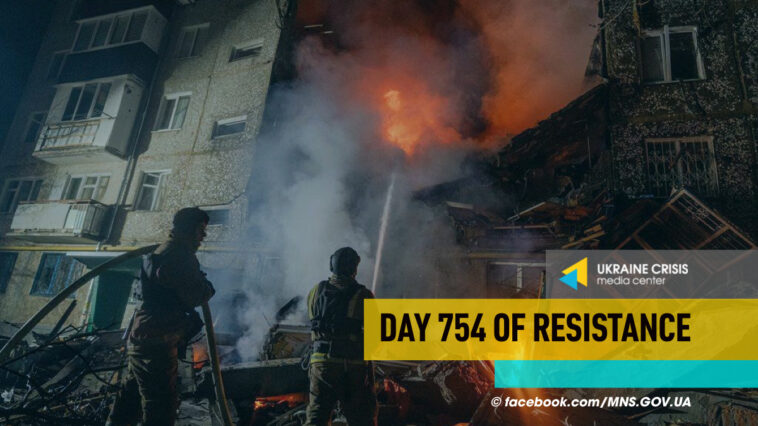Drones launched by Ukraine’s security service have hit 12 Russian oil refineries. Some in Russia see the attacks as serious. The Romanian President formally allows Ukrainian pilots to train on F-16s in Romania, local media reports say. Russia steps up air and artillery strikes on Sumy region, prompting evacuation of the residents.
Ukrainian drones have hit 12 Russian oil refineries. Some in Russia see the attacks as serious
A Ukrainian drone attack on Russia’s Slavyansk oil refinery is at least the ninth such strike on Russian oil facilities in the past week. The Institute for the Study of War (ISW) has analyzed the strike campaign.
The Ukrainian State Security Service (SBU), Special Forces (SOF), and Unmanned Systems Forces reportedly conducted a successful drone strike against a Russian oil refinery in Krasnodar Krai on the night of March 16 to 17. Sources in the SBU told Ukrainian outlet Suspilne that the Ukrainian SBU, SOF, and Unmanned Systems Forces struck the crude oil atmospheric distillation columns of the Slavyansk oil refinery in Slavyansk-on-Kuban, Krasnodar Krai, resulting in a large fire, ISW said in a report on March 17.
A Russian milblogger claimed that two of 17 drones that targeted the Slavyansk oil refinery struck the facility. Suspilne reported that SBU drones have recently successfully struck 12 oil refineries in Russia, ISW said. [The figure was confirmed by another source. According to a Ukrainian intelligence official quoted by Reuters on Sunday, long-range Ukrainian attack drones launched by Ukraine’s security service have hit 12 Russian oil refineries during the war so far. The figure did not include operations conducted by Ukraine’s military intelligence agency (GUR), which has also been attacking refineries with drones, a second intelligence source said.]
A Russian milblogger claimed that the Ukrainian strike on the Slavyansk oil refinery is the ninth Ukrainian strike on a Russian oil refinery in the past week. Another Russian milblogger claimed that Ukrainian strikes on oil refineries are more serious than strikes on fuel depots because international sanctions against Russia complicate Russia’s ability to repair technologically complex oil refinery facilities.
Romanian President formally allows Ukrainian pilots to train on F-16s in Romania, local media reports say
Romanian President, Klaus Iohannis has allowed weapons bound for Ukraine to transit through the country. He also gave the formal green light to allow Ukrainian pilots to get F-16 training in Romania, local news outlet Digi24 said on Monday.
Iohannis sent a letter to the Parliament, notifying lawmakers of his decision to allow the transit of military supplies for Ukraine provided by Finland and authorize the training of around 50 Ukrainian troops in Romania.
The leaders of the parliament’s upper and lower chambers will discuss the letter on Monday. It will be put to a vote during the next joint plenary session.
Ukrainian pilots will train on F-16s at the European F-16 training centre (EFTC), hosted at a Romanian military air base near the town of Fetești. The center referred to as the regional F-16 training hub officially opened in November 2023. Ukrainian pilots will begin training at the base this summer, Digi24 said, citing sources.
Russia steps up air, artillery strikes on Sumy region. An attack on Konotop damages heat network
On Monday, Russia launched a missile strike at Konotop, in Sumy region, and dropped glide bombs at the border region, Ukraine’s Air Force said.
The heat network in Konotop was damaged by the attack, the regional military administration said. There were no casualties.
In the past weeks, the situation in the northeastern region of Sumy has tensed up. The intensity of air strikes and artillery attacks has increased, prompting the evacuation of people from border villages. Russian saboteurs are also highly active in the area.
Over the past six days, residents of areas next to the border are being evacuated from the Okhtyrka, Trostyanets, Velyka Pysarivka, Kyrykivka, Chupakhivka, Boromlya, Hrun, Komyshi, and Chernechchyna communities.
“Russia’s systematic airstrikes force to leave even the people who didn’t plan to flee their home. Local residents say it is no longer possible to stay here. The enemy targets everything. There’s barely a building intact after Russia’s attacks,” police in Sumy region said.
According to Radio Liberty, all children have been evacuated from Velyka Pysarivka, a town under constant Russian shelling. On Sunday, Russian attacks left the center of the town in ruins.
Announcing evacuation at 10:00 on Monday, head of the Velyka Pysarivka community, Lyudmyla Biryukova said: “In view of the security situation, we need to understand that evacuation can be halted at any day.”
Enlargement Candidate Members’ Initiative Explored Further. Ukraine in Flames #586
In February, the European Economic and Social Committee (EESC) launched the Enlargement candidate member initiative status. As part of this initiative, 131 civil society organizations from 9 candidate countries will participate in the work of the committee. This initiative made the EESC the first EU institution to offer the candidate countries a specific opportunity for involvement and participation. Watch Ukraine in flames #586 to find out more about this initiative and why granting this status is important for Ukraine.
Guests:
- Oliver Röpke, President of the European Economic and Social Committee (EESC)
- Marcin Nowacki, EESC member, Chair of the EU side of CSP, Vice-President of the Union of Entrepreneurs and Employers (ZPP)
- Andris Gobins, EESC member, President of the European Movement – Latvia

